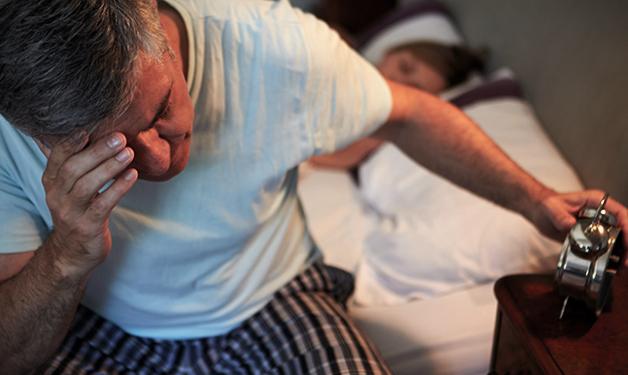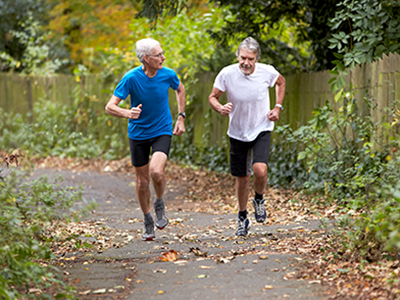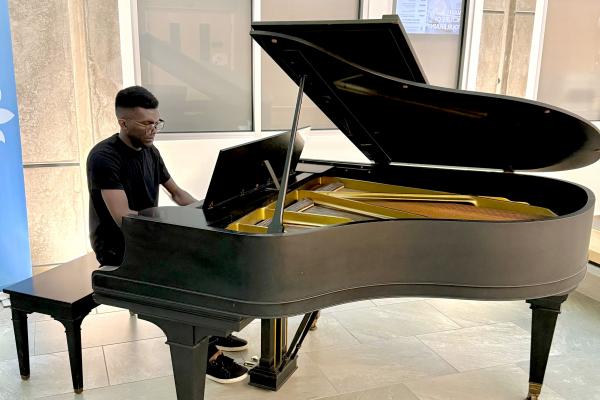
“I say yes to participating in research because it’ll benefit other people and the health care system.”
– John France, Vancouver
Eighty-seven year old Vancouver resident John France never knew he had sleep apnea until his son shared a startling observation.
“He said, ‘I’ve come into the room and you don’t breathe for 45 seconds,” says France. “But I didn’t believe it. That’s a long time, but I wasn’t aware of it because I just kept sleeping I guess.”
His son’s observation concerned him, so France, who was diagnosed with prostate cancer two years earlier, was happy to sign up for a pilot study looking to examine sleep quality in men diagnosed with prostate cancer who were about to start hormone therapy. The study, which requires participants to wear an at-home sleep monitoring system to evaluate how changes in sleep patterns may be caused by side effects of hormone therapy, also known as androgen deprivation therapy (ADT), confirmed that France did indeed have sleep apnea.
According to Vancouver Coastal Health Research Institute clinician scientist and Vancouver Prostate Centre director of development and supportive care Dr. Larry Goldenberg, the study is significant because it is the first trial of its kind quantifying sleep problems by direct measurement in men on ADT.
“For decades we have attributed the fatigue, inability to exercise, cognitive changes and emotional lability suffered by men on hormone therapy purely to the loss of testosterone from their body,” says Dr. Goldenberg (CM, OBC, MD, FRCSC, FACS, FCAHS) who is also urologic surgeon and a professor in the Department of Urologic Sciences at the University of British Columbia.

Study co-investigator and Medical Director of the Prostate Cancer Supportive Care Program, Dr. Celestia Higano, explains that the research team wanted to investigate the possibility that prostate cancer patients’ complaints about poor sleep and fatigue were being caused by side effects related to ADT.
“We decided to first document what’s happening with prostate cancer patients’ sleep before they start ADT so we can establish a good baseline, because let’s face it, people have other reasons behind their sleep problems. For example, most men that we’re dealing with are used to waking up several times a night to urinate,” says Dr. Higano, who is a professor in the Departments of Medicine and Urology at the University of Washington and an associate member in the Department of Urologic Sciences at the University of British Columbia. “With a solid baseline, we can then see what happens as the men go through several months of hormone therapy. We want to document what changes will occur over time.”
To measure the quality of participants’ sleep before starting ADT and three and six months into therapy, the researchers are using the Apnea Risk Evaluation System (ARES™), which is a high-tech, wireless physiological recording device that can be used in-home to determine the presence and severity of sleep apnea. The device can be worn in all sleep positions and consists of a sweatband that goes around the head and attached to it is the ARES™ sensor device worn on the forehead, and two short nasal prongs that go into the nose.
“Traditionally, sleep studies have been done in sleep laboratories where a person goes into a facility and is hooked up to electrodes with wires and other paraphenalia,” says Dr. Higano. “But we found the ARES system to be a lot more user friendly and we liked it because it can be worn at home and it’s fairly easy to put it on yourself.”
“Even though it’s a home device, it gets a lot of very sophisticated information about a person’s sleep – it gives tracings about whether they’re in REM or non-REM sleep,” she adds. “It can show how many times a person is waking up even if they’re not completely waking up. And it looks at blood oxygenation and pulse and then through the nasal cannula it can look at changes in nasal airflow.”
Dr. Higano and her colleagues hypothesize that the poor quality sleep and fatigue that they hear about from prostate cancer patients might result from side effects of ADT therapy, particularly hot flashes. The team will test their hypothesis through participant questionnaires and hot flashes diaries.
“If we’re right and we can connect poor sleep with hormone therapy and possibly hot flashes, we can find some good treatments that might improve their sleep and daytime fatigue levels,” she says.
Dr. Higano stresses the importance of good sleep for prostate cancer patients because of its link to cognitive function, but more importantly, ability to exercise.
“Our thinking is that if prostate cancer patients are feeling tired all the time, it gives them another excuse to not exercise,” she explains.

“Exercise is a powerful ‘medication’ that is non-toxic, low cost, and generally free of side effects except aches and pains,” Dr. Higano affirms. “So if guys are getting a better night’s sleep, the hope is that they will engage in this one behaviour–exercise–that can result not only in improving quality of life but also longevity.”
If you’re a prostate cancer patient wanting to participate in the sleep pilot study, contact research coordinator Maria Spillane at mspillane@prostatecentre.com.
THIS IS ONE PATIENT’S STORY OF PARTICIPATING IN A CLINICAL TRIAL. YOUR EXPERIENCE MAY DIFFER. LEARN MORE ABOUT CLINICAL TRIALS BEFORE PARTICIPATING.


